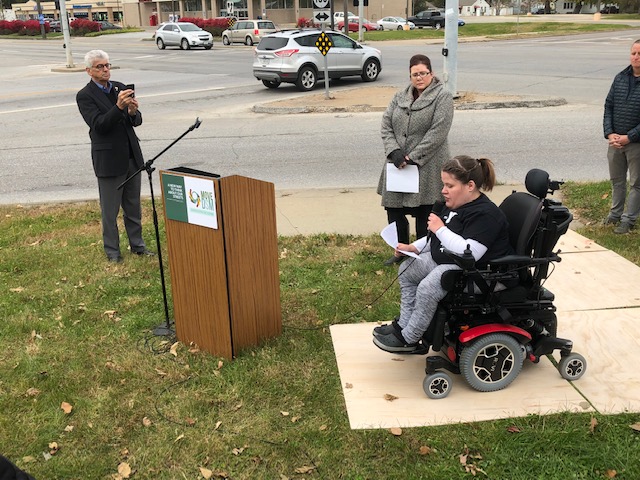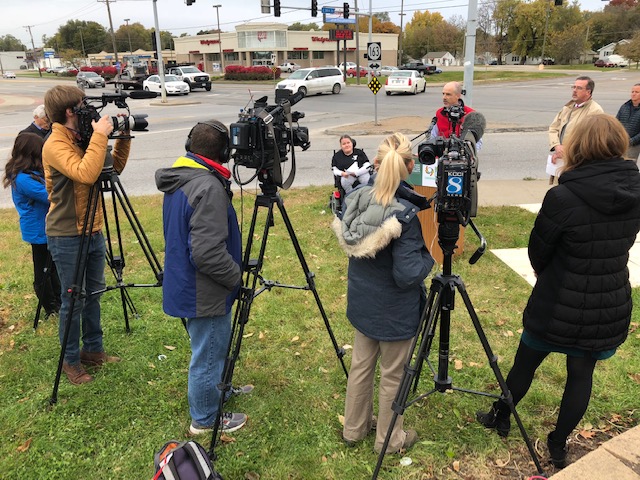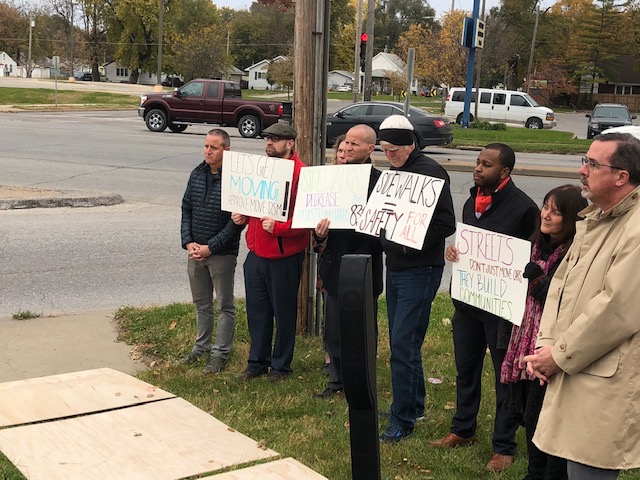AARP Hearing Center

Maddie Miller was born with spina bifida and has been confined to a wheelchair most of her life. Now 22 years of age and employed at the South Suburban YMCA in Des Moines, Miller takes great pride in her independence and relies on Dart transportation to get to and from work. The lack of sidewalks in her neighborhood, however, has put her safety and independence in jeopardy.
“From my experience, some of the sidewalks in Des Moines are not safe or there are no sidewalks at all,” said Miller, who spoke at a press conference on Thursday morning, along with AARP Iowa, the American Heart Association, and Des Moines Public Schools, urging the Mayor and City Council to adopt the Move DSM plan. “I wish for me, as well as others with disabilities, that there is a law or policy enforcing that each street has at least one side with a sidewalk so that everyone would be safe.”
How safe are Des Moines streets? On average, 156 people are killed or seriously injured in traffic crashes each year in the city, with walkers and bikers being disproportionally affected. In fact, since 2008, there have been more deaths from traffic accidents in the city of Des Moines than from violent crime. While a detailed Move DSM plan has been created to address these issues and was vetted with public input this summer, the City Council has not yet acted to move the plan forward.

“The time has come for the city to pass Move DSM to ensure Des Moines remains one of the top cities in America to work, live and play,” said AARP Iowa State Director Brad Anderson, who emceed the media event, which took place outside the State Fairgrounds at the corner of E. University Ave. and E. 30th St., the second most dangerous intersection in Des Moines.* “Cities across the state such as Cedar Rapids, Iowa City, Dubuque, Fairfield, and Mason City to name a few have led on implementing modern multi-modal transportation plans, and Des Moines must do the same.”
Move DSM is Des Moines’ first citywide comprehensive transportation planning effort, establishing a multi-modal vision for transportation in Des Moines over the next 25 years. The plan, which has involved input from stakeholders across the region and has been debated for years, identifies how transportation supports the City’s goals for safety, quality of life, and economic development and ensures that Des Moines is best positioned to provide transportation options for all citizens in every stage of life.
“Move DSM will make communities and neighborhoods more livable by ensuring all people can get safely to where they need to go—work, school, the library, grocery stores, or parks,” said Stacy Frelund, Iowa government relations director for the American Heart Association. “They also help people to feel more connected to their neighbors, which can improve quality of life.”

Des Moines Public Schools have expressed support for the Move DSM plan, which they feel will go a long way towards protecting the more than 33,000 students that head to city schools every week day by car, bus, bike and also on foot.
“One key component in the MoveDSM initiative is making our community more walkable,” said Phil Roeder, director of communications and public affairs for Des Moines Public Schools. “These improvements are not only important for our health and well-being but also for the safety of our kids. Des Moines Public Schools is pleased to join our partners in this effort, and to work with our City in bringing improvements that will benefit us all.”
Members of the public interested in contacting their Des Moines City Council members to urge them to pass the Move DSM plan and complete streets policy can call the main City office at (515) 283-4944 or can send an e-mail through this link https://act.yourethecure.org/YFyfGUo.
*E. University Avenue and E. 30th Street, Des Moines (near the Iowa State Fairgrounds)
• Crashes: 73
• Injuries: 30
• Fatalities: 0
• Vehicles per day: 1.4
• Crashes per traffic volume: 27,957
• State rank: 7
From Des Moines Register (June 29, 2018), breakdown of the crashes between 2012 and 2016 at the 10 most dangerous intersections in the Des Moines metro, according to Iowa Department of Public Transportation.
About the American Heart Association
The American Heart Association is a leading force for a world of longer, healthier lives. With nearly a century of lifesaving work, the Dallas-based association is dedicated to ensuring equitable health for all. We are a trustworthy source empowering people to improve their heart health, brain health and well-being. We collaborate with numerous organizations and millions of volunteers to fund innovative research, advocate for stronger public health policies, and share lifesaving resources and information. Connect with us on heart.org, Facebook, Twitter or by calling 1-800-AHA-USA1.
About AARP
AARP is a nonprofit, nonpartisan membership organization that helps people 50+ have independence, choice and control in ways that are beneficial and affordable to them and society as a whole. AARP does not endorse candidates for public office or make contributions to either political campaigns or candidates. We produce AARP The Magazine, the definitive voice for 50+ Americans and the world's largest-circulation magazine with over 35.5 million readers. AARP Foundation is an affiliated charity that provides security, protection, and empowerment to older persons in need with support from thousands of volunteers, donors, and sponsors. We have staffed offices in all 50 states, the District of Columbia, Puerto Rico, and the U.S. Virgin Islands. For more information, visit www.aarp.org.































































